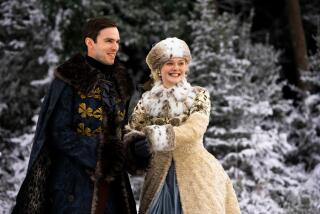The sins of miniseries viewers are visited upon their psyches--if they believe what they see
- Share via
Since my wife and I became hooked on television miniseries, our intellectual and social life has undergone an irreversible degeneration.
Stacks of books remain unread, friends and family are neglected, chores pile up. Night after night we shut ourselves in our living room and stare at the tube as if drugged. We eat at trays; if the phone rings, we pick it up and say, “Can you call later?”
It isn’t the time loss that bothers me. One is still alive, even when one is watching a miniseries. The greater loss is the loss of any sense of living in a real world, surrounded by ordinary people caught up in ordinary situations.
It doesn’t make any difference that the miniseries is sleazy, preposterous, exploitative, ludicrous, plastic, humorless, historically inaccurate, shallow and dull. We are hooked anyway.
When two miniseries begin on the same night, as “Sins” and “Peter the Great” did a week or so ago, we agonize over which one to watch. We can watch them both, of course, since whichever one we don’t watch I can copy on tape. However, I have found that once the series is over, and no one is talking about it anymore, we lose interest.
We decided to watch “Sins.” We had been conditioned by “Hollywood Wives” to enjoy glitzy trash, and I felt sure that’s what “Sins” would be.
“Peter the Great,” on the other hand, was sure to be full of historical absurdities and distortions, archaic dialogue, flamboyant costumery and royal adultery. I had an idea it would really be “Peter the Great’s Sins.”
The recent “Mussolini” had been even worse than “Hollywood Wives,” though George C. Scott made a credible Mussolini, if we believe that Il Duce spent most of his time in bed with his mistress or kissing his children.
So we taped “Peter the Great” on one TV set and watched “Sins” on the other.
It had more fast turns than a slalom. Joan Collins is Helene Junot, a 13-year-old French girl (played in childhood by a younger actress) whose pregnant mother is beaten to death by the Nazis. She and her younger brother and sister are tortured and sent off to labor camps, but Helene is rescued by the Resistance.
At 19, she turns up as a seamstress in the chateau of a rich count. The count’s son, who seems to have a manhood problem, falls for her. The outraged count humiliates and drives her away. She goes to Paris where she rooms (platonically) with a black photographer and gets a job as a model.
Ten years later (this is where Joan Collins takes over the role) she has become a successful couturiere. She falls in love with an American captain who goes to Vietnam and is reported killed.
She hires a detective to find her brother and sister and also the Nazi who tortured them. To pay the detective she goes to the arms of the sadistic old count, who sets her up in Paris. The detective finds her brother in an asylum. He has been catatonic for years. She shows him their mother’s wedding ring and restores his memory. He becomes her business partner.
The detective finds the Nazi. She brings him to trial and he is convicted. As he is led away he vows vengeance. Her brother has fallen in love with his nurse, a novitiate who rejects her vows and marries him. She dies giving birth to a daughter.
Helene falls in love with Gene Kelly, an American concert pianist. They are happy. The young count, embittered by her affair with his father, finds them and accidentally kills Gene Kelly. She goes to the count, threatens to expose his son as a murderer and ruin his family, which goes back to Louis XI, and shakes him down for 100 million francs, with which she finances her couture magazine.
Meanwhile, the Nazi is released from prison. He forms a cabal against her with the count’s son, an Italian publisher she has ruined, and the wife of an American architect whom she has seduced. Meanwhile, the American captain has turned up alive and wants to marry her. But the captain’s mother, the dowager of an old Virginia family, intervenes, telling Helene that her venal past will ruin her son’s chances of becoming senator and President. “We’ve never had a President in the family,” she explains.
Helene withdraws and goes for the architect. The architect’s wife hires a man to sic a killer Doberman on Joan, but the American captain (now a senator) arrives in time to save her life. He is married now, but wants to get a divorce and marry Helene.
Meanwhile, Helene and her magazine face financial ruin and their banker, whose wife’s greed for diamonds has driven him to embezzlement, calls in their note. He has been bribed to do this by the Nazi and his gang. But the Nazi finds out the architect’s wife tried to have Helene killed; he is furious, because he wants her to suffer longer. There is a scuffle over a gun, and the architect’s wife (whose husband has died of a heart attack) kills the Nazi. The banker is found out and jumps out a window.
Helene’s empire is saved. Her niece, who has defied her to marry a laid-back American saxophone player, takes over the magazine as editor and scores a triumph. Helene marries the senator and they live happily ever after.
If you can believe Joan Collins as a 29-year-old Parisian model (and why not?), you can believe the whole thing.
More to Read
The complete guide to home viewing
Get Screen Gab for everything about the TV shows and streaming movies everyone’s talking about.
You may occasionally receive promotional content from the Los Angeles Times.






